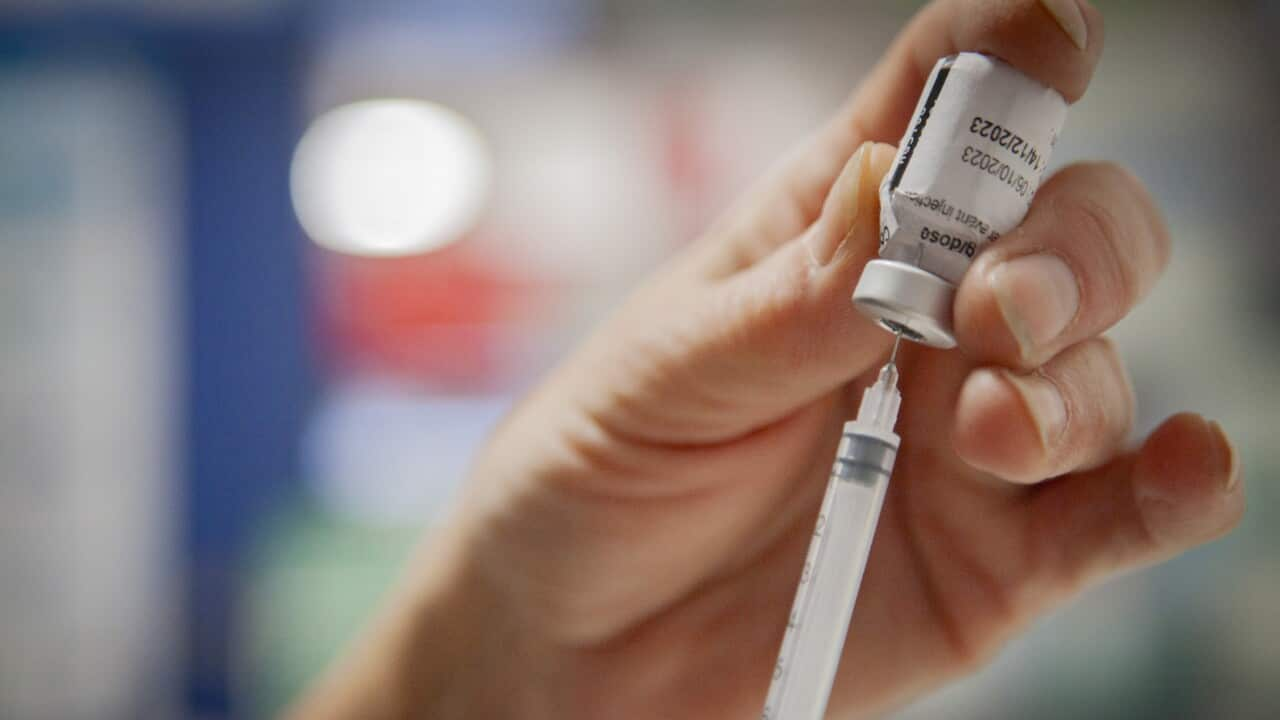The US federal medicines regulator is changing how it approves COVID-19 vaccinations, a move that may restrict access to millions of children and adults under the new criteria.
The US Food and Drug Administration (FDA) is altering the type of evidence it will accept from vaccine manufacturers and will require new clinical trials for approval of annual COVID-19 boosters for healthy Americans under the age of 65.
The changes mean people under 65 may no longer be eligible for new COVID-19 vaccinations, an infectious diseases expert told SBS News.
Paul Griffin, an associate professor of medicine at the University of Queensland, who has also run clinical trials for COVID-19 vaccinations, described the FDA’s decision as “absurd”.
“Restricting access to vaccines can only increase the impact of COVID-19,” he said.
“If we restrict vaccines to people over 65, as appears to be the case in the US, there’s a whole host of people who may get a more significant infection who won’t have the option to be protected,” Griffin said.
So why is the FDA making changes?
It comes down to what US health officials say is a lack of evidence about the efficacy of COVID-19 boosters.
What’s happening in the US?
FDA commissioner Marty Makary and top US vaccines regulator Vinay Prasad wrote in the New England Journal of Medicine on Tuesday that the benefit of repeated annual shots for healthy adults was uncertain after several years of the virus circulating and vaccines being available.
They also said the US was an outlier among high-income nations in recommending yearly shots for healthy adults.
“At-risk Americans can be reassured that they will be covered by such approvals. At the same time, we want more evidence at the US Food and Drug Administration,” Prasad told scientists at the FDA during a live-streamed presentation.
“We want to know more about what these products are doing, especially as we enter the seventh, eighth and ninth dose.”
Makary and Prasad said they expect the FDA will be able to approve the boosters for adults over the age of 65 based on data from tests that measure immune response in patients.
The shots would also be available for everyone over the age of six months with one or more issues that put them at high risk for severe COVID-19 outcomes, they said.
But for healthy people between the ages of six months and 64 years, the FDA expects it would require formal clinical trials for pharmaceutical companies to get approval to manufacture annual shots.
Prasad said all the COVID-19 vaccine makers will be asked to conduct placebo-controlled trials in healthy 50 to 64-year-olds and encouraged to conduct them in very young children.
‘Unethical’ process
Griffin warned millions of healthy adults and children stand to lose access to updated vaccines under the new criteria.
“While people with co-morbidities and the elderly are typically more vulnerable, the unfortunate reality is severe disease isn’t restricted to those groups,” he said.
Requiring new, expensive and lengthy clinical trials for approved vaccines was a step backward in his view, and using placebos in these trials is “unethical”, he said.
“If we’re looking at improving or updating vaccines, we don’t typically go back to including placebos because essentially it’s unethical to do so,” he said.
“If there’s a vaccine already approved, there’s a reason that’s the case. And so then to enrol people in a clinical trial and basically restrict them from receiving what would be considered best practice is actually unethical.
“Typically, when we’re improving vaccines, we include the current standard of care, the approved vaccine rather than a true placebo.”
Griffin said the FDA decision may be influenced by anti-vaccine sentiment in the US.
US health secretary Robert F Kennedy Jr, one of the country’s top vaccine critics whose department oversees the FDA, has been reshaping the decades-old federal system for approval and use of vaccines while also taking steps to align with US President Donald Trump’s goal of shrinking the federal government.
Some 20,000 people have left the department as part of mass layoffs.
How will supply and cost be impacted?
Roger Lord, a senior lecturer in medical sciences at the Australian Catholic University, said the risks of serious hospitalisation would be less for younger healthy people who have already received boosters and may not need a yearly shot to increase their immunity.
But for those still wanting to get vaccinated, supplies could decrease, and costs increase, he said.
As clinical trials are expensive undertakings for pharmaceutical companies, they could also lead to delays, Lord said.
“When it comes to any drug or vaccine, when it’s going through the regulatory process, the most expensive and time-consuming component of testing is actually clinical trials,” he told SBS News.
“The pharmaceutical companies that manufacture these vaccines they’re going to have to pass on those costs associated with that clinical trial back onto the consumer to recover those costs.”
He said these additional costs could lead to companies producing fewer vaccines, which could mean less availability here in Australia.
“If they work out their profit margins are not going to be significant enough to produce more vaccines, it would potentially affect the supply chain in Australia,” he said.
“These companies are profit-driven like any business and are working in the best interest of shareholders.”
Could the same thing happen in Australia?
Griffin was confident a similar decision would not be made by the Therapeutic Goods Administration (TGA), which is responsible for regulating medicines in Australia.
“I really doubt that the TGA will because they’re a tremendously reputable regulatory body and they do engage a lot of genuine expertise to make the recommendations that they do,” he said.
However, politicians and public sentiment can erode confidence in vaccines, which can affect the uptake of vaccinations and not just COVID-19 boosters, he said.
“The fear that I have is that people, the public and certain politicians are already aligning with some of those concerning things that are happening abroad, including in the US, and may call for these sorts of things to happen and further undermine their confidence in vaccines,” he said.
Griffin said a particularly worrying trend is the decline in childhood vaccinations.
A 2024 report from the National Centre for Immunisation Research and Surveillance found that children aged from 12 months to 5 years old were less vaccinated in 2023 than in 2020.
What does the TGA say?
A spokesperson for TGA said it was independent of FDA influences.
“While the TGA does work closely with international counterparts, including the United States Food and Drug Administration (US FDA), the TGA independently reviews the data and makes its own decision based on the evidence provided by the sponsor, and within the Australian context,” the spokesperson said in a statement to SBS News.
The spokesperson also said TGA does not conduct clinical trials and is “unable to compel a sponsor or manufacturer of a medicine to conduct a clinical trial”.
They said access to COVID-19 boosters will “remain free in 2025” for eligible Australians.
“Government will continue to consider future arrangements supporting the access, supply and distribution for COVID-19 vaccines.”
— With additional reporting from Reuters news agency.

